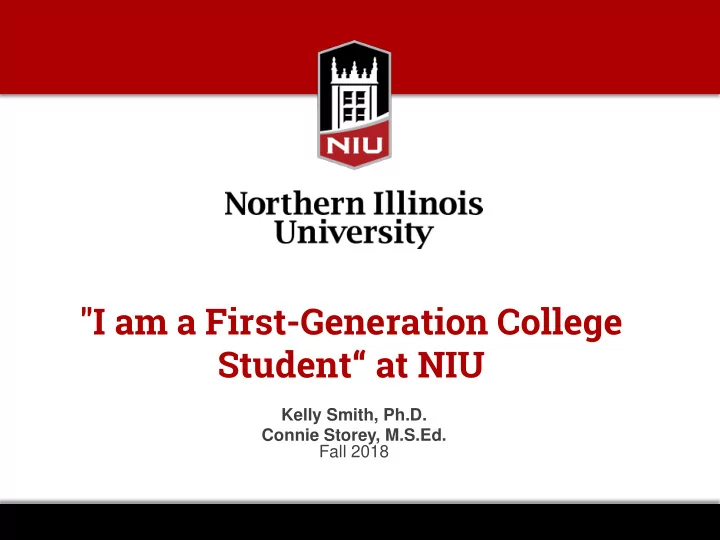

"I am a First-Generation College Student“ at NIU Kelly Smith, Ph.D. Connie Storey, M.S.Ed. Fall 2018
Learning Outcomes • Identifying first-generation faculty and staff • Understanding first-generation students’ needs • Creating/highlighting first-generation student support systems • Connecting first-generation students with faculty/staff and alumni who self-identify as first-generation
FGCS By the Numbers National Center for Education Statistics (NCES) for 2011-2012 academic year: • 34% of undergraduates were the first in their families to go to college. • An additional 28% had parents with at least some college experience but not a bachelor’s degree. At NIU: Fall 2017 Undergraduates New All Freshmen Undergraduates Count 1852 13454 First Generation 52% 48%
FGCS Student Profile Compared to peers from college-educated families: • Less family and social support • Higher levels of stress • More likely to come from low SES and minority backgrounds • Interact with peers less • More likely to live off-campus • Work more hours per week • Access to fewer supportive resources • Received less academic preparation during high school • Often enroll in community college, then may go on to a 4-year school • More likely to drop out of college after the first year • Cite reasons for attending college as – Upward social capitalism – Ability to help out their family financially after graduation Bui 2002; Collier & Morgan, 2008; Jenkins el al., 2013; Mehta et al., 2011; Soria & Stebleton, 2012
Transition to College Depends On: • Support system • How much they identify with the collegiate experience • Amount of additional responsibilities (work and family commitments) • Expectations about college established prior to matriculation, especially along race and class social identities – Who belongs? – Who would be successful in higher education? Collier & Morgan, 2008; Orbe, 2004; Jenkins et al, 2013
Implications for Working with FGCS • Understanding the importance of familial and cultural norms • Balancing home, work, and school • Addressing negative intrapsychic emotions (guilt, fear, sadness, loneliness) • Connection to support groups • Helping students bridge the initial gap of arrival/doubt to developing experience/agency – connection to financial, academic, and social resources – particularly with people and places who feel “safe” on campus due to shared culture/understanding of their experiences
Institutional Support Structures Means & Pyne 2017 Enhance students sense of belonging: • Connection to early programs • Need-based scholarship programs • Social-identity based student organizations • Community-building within residence halls • Supportive faculty and mentors • Academic support services • High-impact educational practices (i.e. study abroad, service learning programs)
Identifying first-generation faculty and staff • Survey to faculty and staff • Proposal (initial meetings) • Creating working group • Evaluation • Website updates • Door decorations
Understanding first-generation student needs • Proposal • Working Group (guests) • White paper/fact sheet • NIU Today articles • Evaluation
Building/highlighting first- generation student support systems • Website updates • Breaking Barriers • Imposter Syndrome event • Resource Fair
Connecting first-generation students with faculty/staff and alumni • NIU Today articles on website • Website updates • Breaking Barriers • Imposter Syndrome event • Alumni/faculty speaker • Faculty Social Room
First-Generation Support at NIU • Breaking Barriers • I am First Gen!
First-Generation Welcome Head Start Event Report: Year in School Day 1-2
Are you a first-generation student?
After attending this event I feel more prepared for college at NIU?
After attending this event, I feel more confident that I will find support at NIU.
What was most helpful at this event?
Check all that apply. After attending this event, I plan to:
How did you hear about this event?
How can you do this on your campus? • Break into small groups for discussion • Report back as a large group
References Barry, L., Hudley, C., Kelly, M., & Cho, S. (2009). Differences in self-reported disclosure of college experiences by first-generation college student status. Adolescence, 44 , 55-68. Bui, K. (2002). First-generation college students at a four-year university: Background characteristics, reasons for pursuing higher education, and first-year experiences. College Student Journal, 36 , 3-11. Collier, P. & Morgan, D. (2008). “is that paper really due today?”: Differences in first -generation and traditional students’ understanding of faculty expectations. Higher Education, 55 , 425-446. Covarrubias, R., Romero, A., & Trivelli, M. (2015). Family Achievement Guilt and Mental Well-being of College Students. Journal of Child and Family Studies, 24 , 2031-2037. Gibbons, M. & Shoffner, M. (2004). Prospective first-generation college students: Meeting their needs through social cognitive career theory. Professional School Counseling, 8 , 91-97. Jenkins, S., Belanger, A., Londono Connally, M., Boals, A., & Duron, K. (2013). First generation undergraduate students’ social supports, depression, and life satisfaction. Journal of College Counseling, 16 , 129-142. Means, D. & Pyne, K. (2017). Finding my way: Perceptions of institutional support and belonging in low-income, first-generation, first-year college students. Journal of College Student Development, 58 , 907-924.
References Mehta, S., Newbold, J. & O’Rourke, M. (2011). Why do first -generation students fail? College Student Journal, 45 , 20-35. Orbe, M. (2004). Negotiating multiple identities within multiple frames: An analysis of first-generation college students. Communication Education, 53 , 131-149. Padgett, R., Johnson, M., & Pascarella, E. (2012). First-generation undergraduate students and the impacts of the first year of college: Additional evidence. Journal of College Student Development, 53 , 243-266. Pascarella, E., Pierson, C., Wolniak, G., & Terenzini, P. (2004). First-generation college students: Additional evidence on college experiences and outcomes. Journal of Higher Education, 75 , 249-284. Reid, M. & Moore, J. (2008). College Readiness and academic preparation for postsecondary education: Oral histories of first-generation college students. Urban Education, 43, 240-261. Soria, K., & Stebleton, M. (2012). First- generation students’ academic engagement and retention. Teaching in Higher Education, 17 , 673-685 Stebleton, M., Soria, K., & Huesman Jr, R. (2014). First-generation students sense of belonging, mental health, and use of counseling services at public research universities. Journal of College Counseling, 17 , 6-20.
Recommend
More recommend